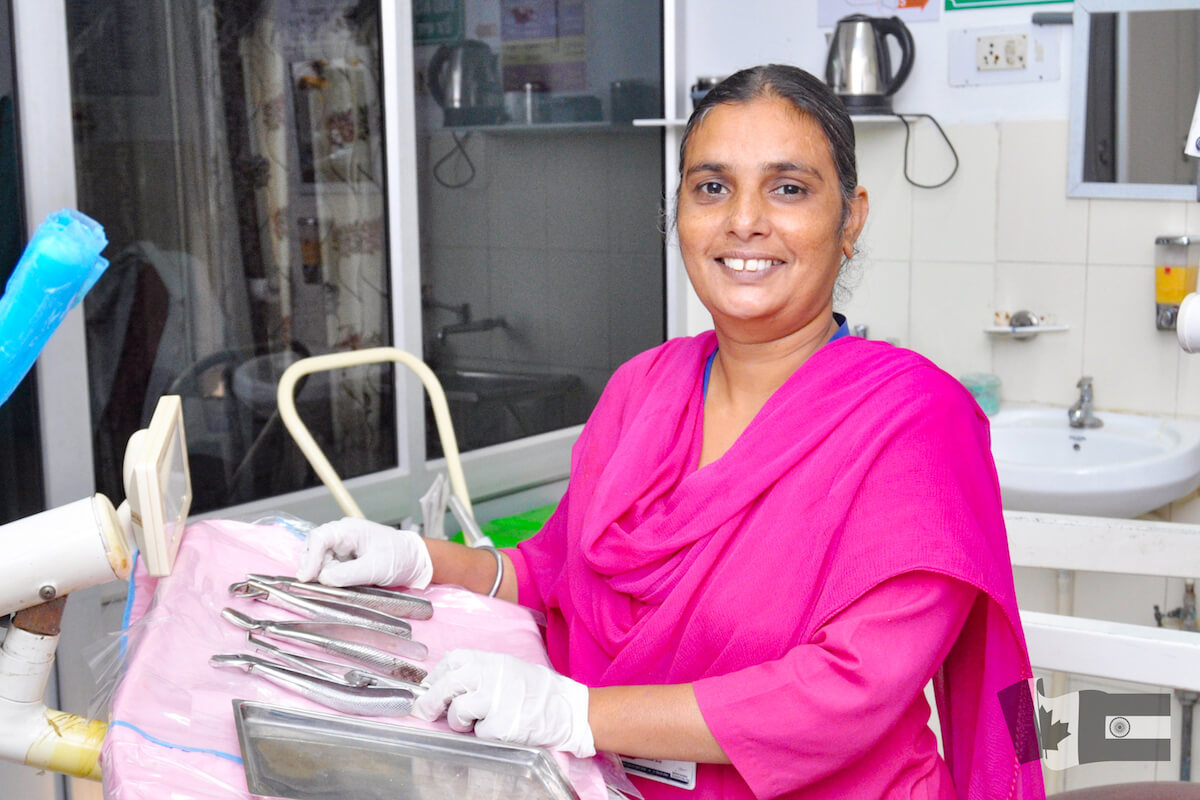
When Reena was a child, she was taught the value of honest and hard work. She adopted the life philosophy that, “regardless of the type of work you do, earn your own roti (bread) – dry or buttered.”
To her, that also meant working with integrity, respecting elders, and knowing the importance of living within your means.
Those lessons became a life-saving force when she grew into adulthood; her story became one of tragedy and survival, and of not giving up.
Her background and early years
Born in 1981, Reena grew up in a rural, Punjabi village called Chak Ramun. Her family is part of the “landless poor,” classified by the government of India as “Other Backward Class” (OBC).
The family lived in a two-room, mud thatched (i.e. kutcha) house that leaked in rainy seasons. One room was a kitchen. The other was for sleeping. The fields were their bathroom. They had a hand pump for filling buckets with water so they could bathe outside.
Reena’s father was a menial labourer with four children to feed. Her mother, like other women of the time, worked inside the house while also doing domestic chores for others.
Despite their subsistence-level living, Reena’s parents found a way to send their children to civil school – the most poorly-funded option in India, and one that still requires some fees.
Most children in her village, especially girls, received no education. Some attended school up to grade 2.
By grade 10, the family couldn’t afford Reena’s tuition any longer. So, the community helped. At 19, she graduated from high school. It was a monumental accomplishment, and one she carries with pride.
Reaching adulthood and veering into marriage
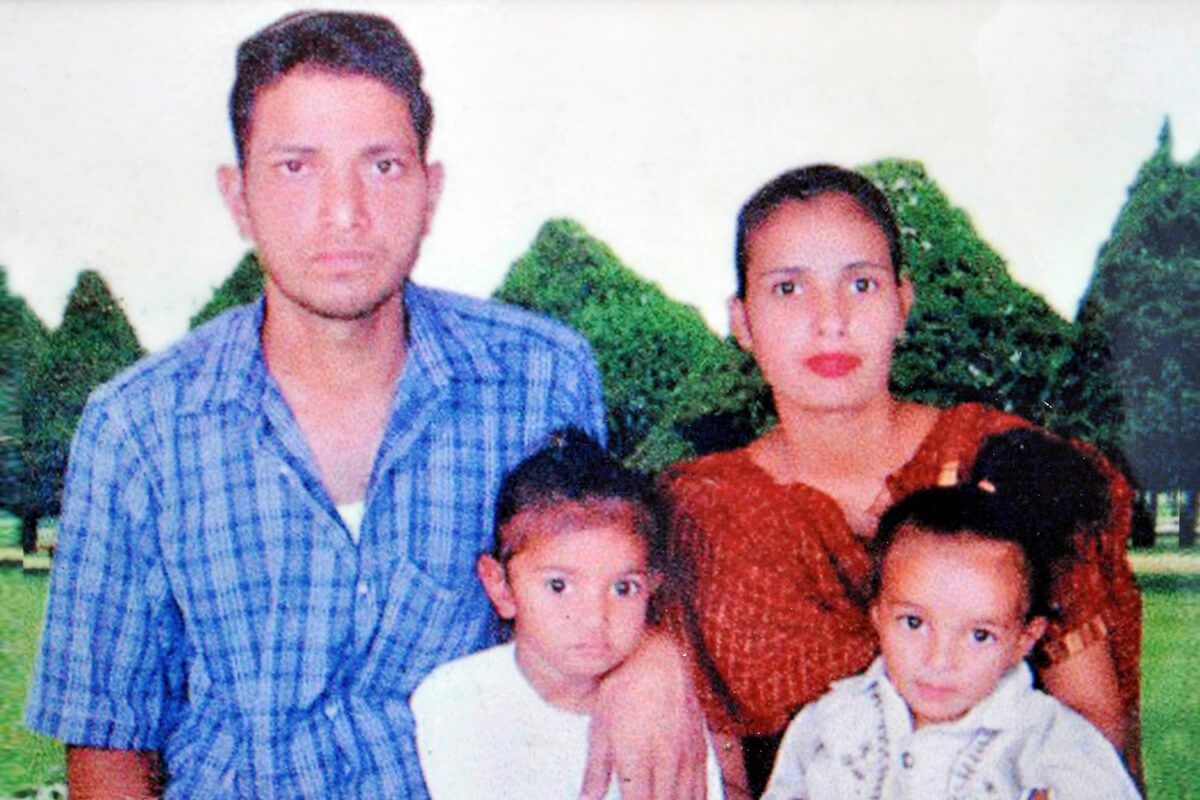
While some would explore career options after graduation, those thoughts were inconceivable to Reena. She knew her destiny was to be married as soon as she graduated.
Choosing her own partner was also impossible. Reena waited for her parents to find her a husband. This was normal, and expected in the culture.
She was notified when the search was underway. Within two months, the match-making came to an end. Reena was set to meet her husband on her wedding day.
While waiting for marriage, she was saddened to learn that her future husband was a low-level labourer, like her father. She wished for someone who had an education, like she did. But communicating those aspirations to her parents was out of the question.
In 2002, the day came, and she fulfilled her role as a bride. She was 22. Her husband was 24. She moved into his home in Dhahan.
Waking up to tarnished dreams
Reena always imagined married life would be among in-laws, who would be part of her community. Or, that she would work in the home while her husband brought in income.
She was awarded none of those pleasantries.
Shortly after marriage, she learned her husband had been a diabetic. He was married off by his cousin, who withheld this information. His parents had passed away.
Within a year, Reena became pregnant. Another year later, her husband was in an automobile accident. He fractured his right leg. He was unable to recover, or to work.
With a child in tow, Reena began cleaning houses for others in the village. She was desperate to earn a living to feed her family and pay her husband’s medical bills.
Finding hope at a charitable hospital
Shortly after her husband’s accident, Reena received a glimmer of hope from a local man who knew her situation. His name was Dharam Singh. The villagers called him “Dharma” for short. He knew the late Budh Singh Dhahan, founder of Guru Nanak Mission Medical and Educational Trust (GN Trust) in Dhahan-Kaleran).
Dharma took Reena to meet Mr. Dhahan. Reena boldly asked him for a job.
Mr. Dhahan, impressed by her education, told her they had an opening as a principal’s assistant (PA).
Reena took the job. It entailed cleaning the office, taking files from one office to another, and serving biscuits and tea to visitors.
Facing unimaginable tragedy
By 2005, during her time as a PA, Reena gave birth to a second child, a son named Sachin. When he was three years old, he came down with a cough and had trouble breathing.
She didn’t know what to do; she gave him some medicine at home. Within a couple days, the condition worsened. She held her baby against her chest and began walking to the Guru Nanak Mission hospital.
On the way there the baby died.
Determined to advocate for her daughter
After three years of dedicating herself as PA, Reena built up the courage to approach Mr. Dhahan again. This time, it was for her daughter’s sake.
“I have worked at this job for three years now,” she told him. “I want to put my daughter in school. I want a promotion.”
Mr. Dhahan agreed. He offered to train her as a dental assistant for 6 months, afterwhich, she would work as one in their hospital.
As an employee of the GN Trust, her daughter was enrolled in kindergarten for 50% reduced tuition at their public school. Her husband would receive free medical care at their hospital.
That decision elevated Reena’s life, and that of her daughter. She began earning enough to pay her bills, and her daughter’s school fees.
“My father was always ready to help girls and women from poor families,” says Barj Dhahan, son of Budh Singh Dhahan. “He saw in her a determination to work and take care of her family. She wanted to send her daughter to school. My father wanted to educate women and young girls.”
Living with grit and gratitude
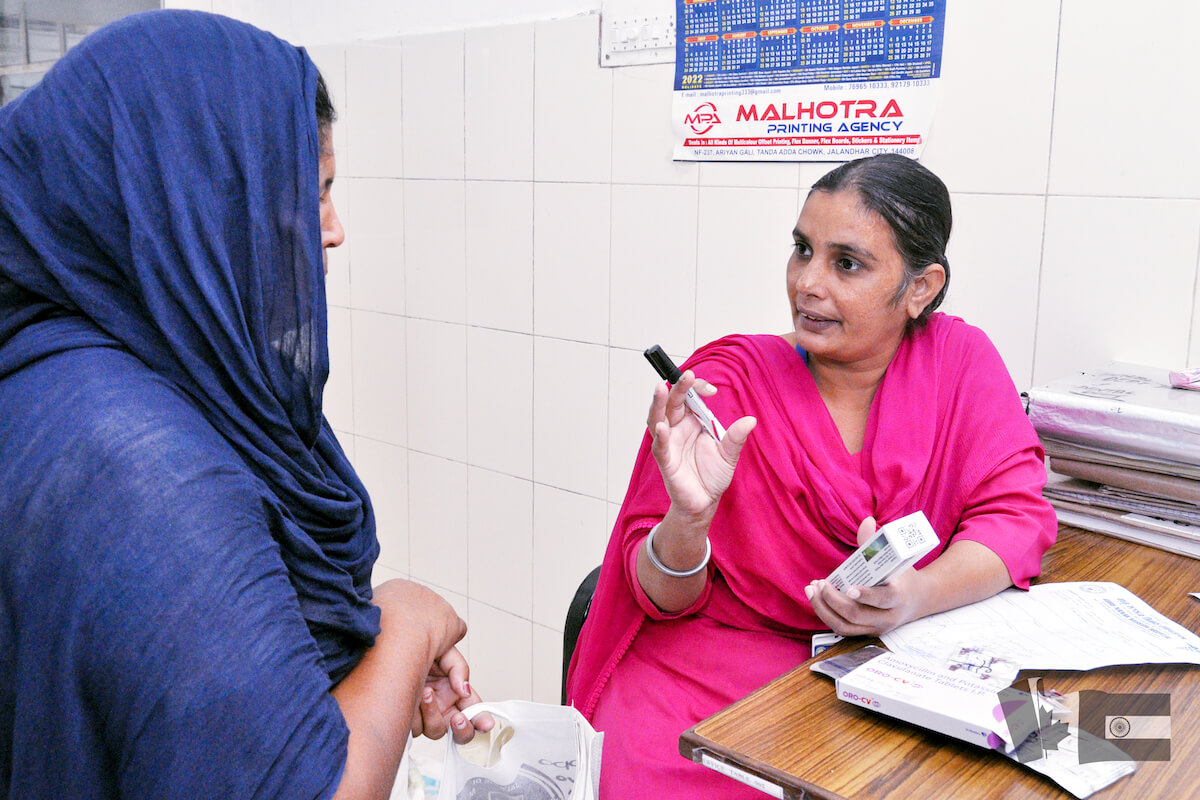
Reena has come to be known as one of the happiest, most confident and caring employees at Guru Nanak Mission Hospital.
“I love taking care of my patients,” she remarks. “I want them to leave satisfied.”
Reena’s salary is just enough to get by on a month-to-month basis. There is no possibility of saving for the future.
Thankfully, she doesn’t have housing fees, since she inherited her in-laws’ brick (i.e. pucca) ancestral home (referred to as ‘jadhi ghar’). It has a small kitchen, a washroom with cold running water, and a living area of about 12×12 feet, where she and her daughter also sleep. Government provides electricity for the poor in the region.
Unfortunately, her small backyard faces a sludge pond, which is the village sewer. And yes, it stinks.
Snakes visit in the summer, which she has to kill.
During heavy rain, the house leaks. Reena hires a local handyman to repair it.
Still, Reena shows gratitude for what GN Trust has given her.
“My family is the hospital, and this is everything to us. It’s all we have. Guru Nanak Mission has stood beside us and supported us. It’s everything,” says Reena.
In 2014, Reena’s husband passed away. He was 36.
Striving to build a future for her daughter
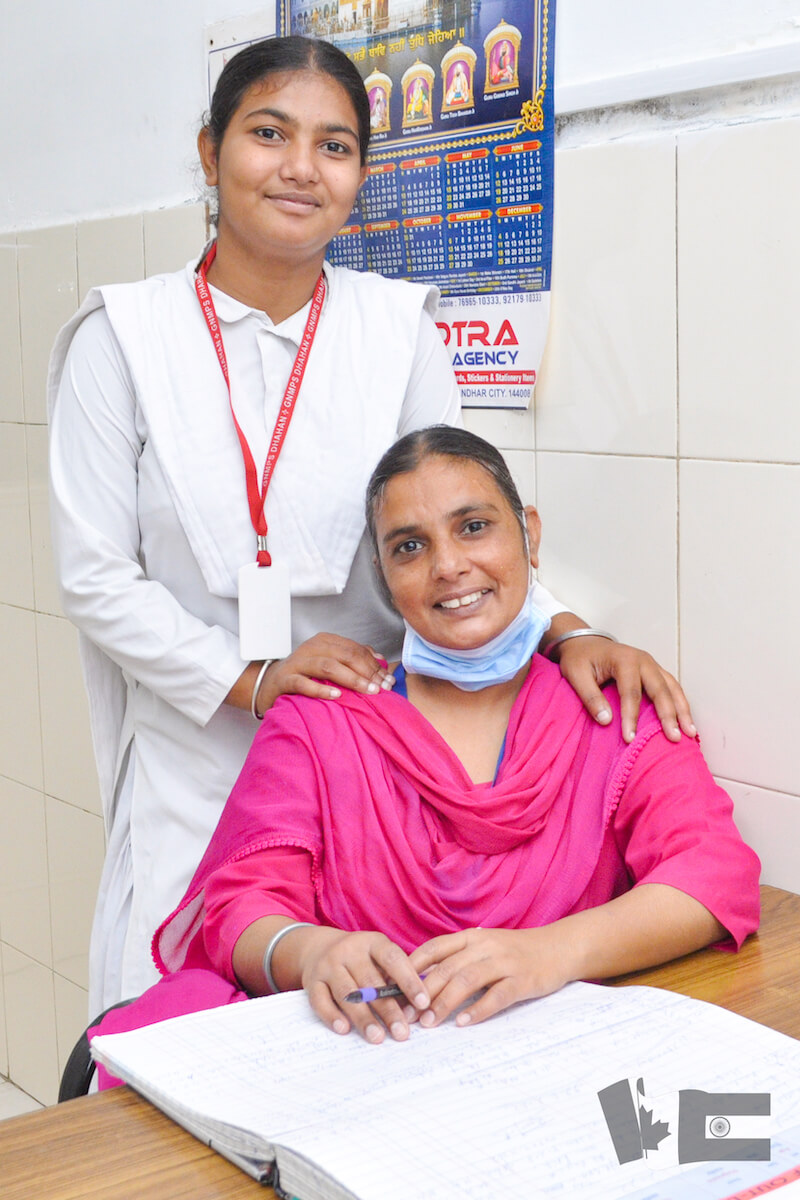
“I’m glad that my daughter is in school,” says Reena. “I want her life to be better than mine.”
Those words have been noticed in action by Reena’s daughter, Tarndeep.
“My mother has struggled, and she struggles every day to support me. She is always willing to do what needs to be done for me,” says Tarndeep.
Reena also has no desire to pressure her daughter into marriage, like she was.
“My wish is that the way I struggled, my daughter would be spared of that struggle. I am not thinking of getting her married. I want her to go further with her education,” she says.
Tarandeep feels the same way. Now that she’s in her last year of high school, she wants to attend nursing school at Guru Nanak College of Nursing. She’ll begin her applications in August, 2023.
Still facing walls at every step
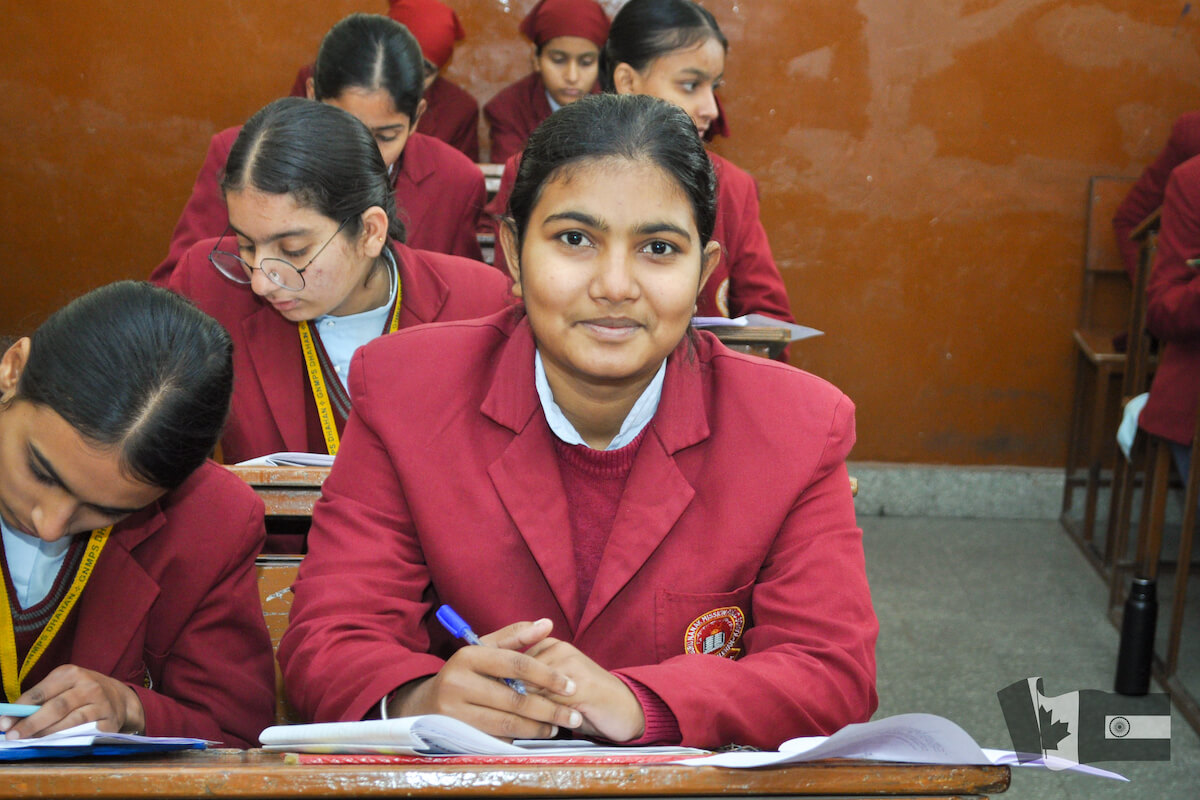
The college Tarandeep wants to attend is located on the same campus where her mother works, and where she attended elementary and high school. It’s also run by the same organization that helped Reena and her daughter get to where they are today.
There is just one problem: while the college is run as a non-profit, nursing school fees are set by the state government. Tuition comes to ₹70,000 (approximately $1,150 CAD) per year.
Reena’s salary, like that of many others, simply can not afford the fees for her daughter.
Student jobs and loans are non-existent in rural India.
Setting an example of the need for charity
Without charitable help, there would be no way for Tarandeep to advance her education beyond high school – even with a full-time, hard-working mother to support her.
“My wife Rita asked me, ‘why can’t we just pay the fees?’” recalls Barj Dhahan, who continues to support his father’s mission in India, namely at GN Trust. “I told her that’s what we are trying to do.”
The social entrepreneur, who lives in Vancouver, B.C., Canada, fundraises through Canada India Education Society (CIES). The organization is a registered Canadian charity he founded with family and friends in 1991. Its primary mission is to help marginalized people in Punjab with healthcare and education services.
“There are thousands like Reena and Tarandeep. There will always be more. Our goal is to open doors, give opportunities. These people can’t advance their economic situation without donors, even when they work hard,” explains Barj Dhahan.
That’s why the organization hopes to change the outcome for as many students as possible, starting in 2023.
“We want to support 10 needy students who otherwise would not have a way to attend nursing school,” says Barj Dhahan. “But to make it happen, we need the help of our community, both here and abroad.”
To that end, CIES has begun a fundraising campaign entitled, “Send young girls to nursing school in rural Punjab.”
Those wishing to donate to the campaign can do so at the following link:
https://www.cies.ca/donate-via-canadahelps/
All donations within Canada receive a tax receipt.
The charity’s contact information is as follows:
Telephone: (604) 278-6721
Email: admin@cies.ca
Address: 1058 – 2560 Shell Road, Richmond, B.C., V6X 0B8, Canada